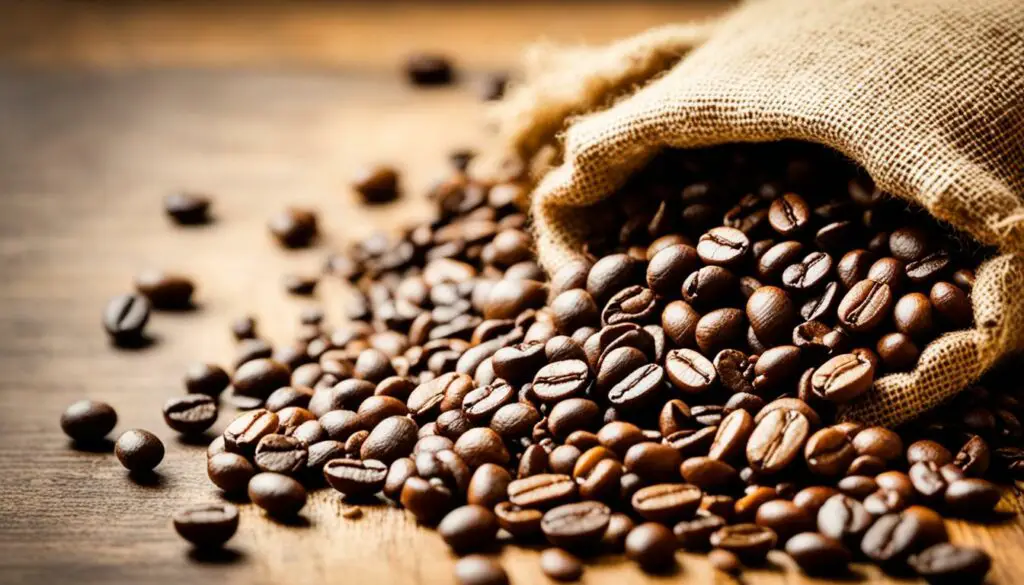I never anticipated how my daily coffee habit would evolve. Struggling with weight, I discovered organic coffee beans. This simple change profoundly impacted my life.
My exploration began with a conversation at a local cafe about caffeine and metabolism. This sparked my interest in organic coffee beans and their role in natural weight management.
The more I learned, the more intriguing it became. Organic coffee beans and weight loss were not just rumors. They were supported by scientific evidence. I discovered chlorogenic acid, a compound in coffee linked to weight control.
This knowledge piqued my interest. Could my daily coffee be the solution to my weight issues? I decided to experiment. Follow me as I recount my experience with organic coffee beans and their effects on my weight loss journey.
Understanding Organic Coffee Beans
I’ve always been curious about organic coffee beans and their benefits. Let’s dive into what makes these beans special and why they’re gaining popularity among health-conscious coffee lovers.
What Makes Coffee Beans Organic?
Organic coffee beans are grown without synthetic pesticides or fertilizers. Farmers use natural methods to cultivate these beans, resulting in a purer product. The certification process is strict, ensuring that organic coffee meets high standards.
The Difference Between Organic and Conventional Coffee
The main difference lies in the growing methods. Organic coffee is grown sustainably, while conventional coffee often relies on chemicals. This impacts not only the environment but also the flavor profile of the beans.
| Aspect | Organic Coffee | Conventional Coffee |
|---|---|---|
| Growing Methods | Natural fertilizers, pest control | Synthetic chemicals |
| Environmental Impact | Low | Higher |
| Flavor Profile | Rich, complex | Variable |
| Price | Generally higher | Usually lower |
Health Benefits of Organic Coffee
Organic coffee beans are packed with antioxidants, including chlorogenic acid. These compounds may offer various health benefits, from supporting metabolism to regulating blood sugar levels. The absence of synthetic chemicals in organic coffee might also reduce potential health risks associated with conventional coffee consumption.
I’ve found that switching to organic coffee has made a noticeable difference in my daily routine. The rich flavor and potential health perks make it a worthwhile choice for coffee enthusiasts like me.
The Science Behind Coffee and Weight Loss
Coffee’s potential for weight loss has always fascinated me. I’ve uncovered some intriguing scientific insights about its impact on our bodies and metabolism. Let’s explore the key components that make coffee a potential ally in managing weight.
Caffeine and Metabolism
Caffeine, a key component of coffee, significantly boosts metabolism. It increases our energy expenditure and fat oxidation. Research shows caffeine can elevate metabolic rate by 3-11%. This means burning an extra 79-150 calories daily.

Chlorogenic Acid and Its Effects
Chlorogenic acid, a compound found in coffee, has caught my eye for its fat-burning properties. This antioxidant reduces glucose absorption in the digestive tract and enhances insulin sensitivity. It may lead to a decrease in body fat percentage and weight loss.
Green Coffee Bean Extract
Green coffee extract is becoming increasingly popular as a weight loss supplement. Derived from unroasted coffee beans, it’s rich in chlorogenic acid. Studies indicate it can help with weight reduction by influencing blood sugar handling and metabolism.
| Component | Benefits | Effects on Weight Loss |
|---|---|---|
| Caffeine | Increases metabolism | Burns extra calories |
| Chlorogenic Acid | Reduces glucose absorption | Decreases body fat percentage |
| Green Coffee Extract | Rich in chlorogenic acid | Aids in overall weight reduction |
Through my research, I’ve come to value the complex relationship between coffee’s components and their fat-burning effects. While coffee isn’t a magic solution, it can be a valuable part of a comprehensive weight loss plan.
My Personal Experience with Organic Coffee Beans and Weight Loss

My weight loss journey took an unexpected turn with organic coffee. I’d always been a coffee enthusiast, but switching to organic beans significantly boosted my energy and well-being.
I began drinking 2-3 cups of organic coffee daily, alongside other lifestyle adjustments. Within weeks, my metabolism surged. I felt more energetic during workouts and found it simpler to adhere to my healthy diet.
To monitor my progress, I meticulously logged my coffee intake, exercise, and weight changes. Below is a summary of my results over three months:
| Month | Organic Coffee (cups/day) | Exercise (hours/week) | Weight Loss (lbs) |
|---|---|---|---|
| 1 | 2 | 3 | 3.5 |
| 2 | 3 | 4 | 5.2 |
| 3 | 3 | 5 | 6.8 |
While organic coffee wasn’t the sole reason for my weight loss, it was a crucial factor. The benefits of organic coffee went beyond weight management. I noticed enhanced focus and productivity, which aided in maintaining my commitment to a healthy lifestyle.
It’s crucial to recognize that individual experiences may vary. For me, combining organic coffee with balanced nutrition and regular exercise formed a sustainable path to weight loss and health enhancement.
Incorporating Organic Coffee into a Weight Loss Regimen
Integrating organic coffee into my weight loss strategy has been transformative. It’s essential to understand the optimal times and methods for consumption to maximize its benefits. Here, I’ll share the insights I’ve gathered on this topic.
Best Times to Drink Coffee for Weight Loss
The timing of coffee intake is vital for shedding pounds. I’ve discovered that the morning, either upon rising or post-exercise, is the most effective time. It’s crucial to maintain a 2-3 hour gap between coffee and meals to manage blood sugar levels effectively. To ensure undisturbed sleep, I refrain from coffee in the evening.
Ideal Brewing Techniques
The brewing process significantly influences coffee’s efficacy in aiding weight loss. I favor French press or cold brew for their ability to retain essential nutrients. These methods ensure that the coffee’s chlorogenic acid, a key compound for weight management, is not lost during brewing.
| Brewing Method | Benefits for Weight Loss |
|---|---|
| French Press | Preserves oils and antioxidants |
| Cold Brew | Lower acidity, smoother taste |
| Espresso | Concentrated caffeine boost |
Avoiding Common Mistakes
My experience has taught me to avoid certain pitfalls. I always opt for black coffee, eschewing cream and sugar to prevent calorie intake. Adding these can significantly up the calorie count, undermining the coffee’s weight loss benefits. Instead, I explore natural flavorings like cinnamon or mint to enhance taste without the calories.
It’s important to remember, coffee is not a standalone solution for weight loss. I combine it with a balanced diet and regular physical activity for a well-rounded approach. This integrated strategy has proven effective in my weight loss endeavors.
Challenges and Considerations
My journey into organic coffee revealed several significant challenges. It’s vital to approach this shift with a balanced view. The advantages are clear, but so are the hurdles.
Potential Side Effects
Excessive coffee intake can lead to unpleasant side effects. For me, it caused jitters and affected my sleep. Finding the right balance is crucial for your well-being.
Sustainability and Ethical Concerns
Sustainable coffee production is a complex issue. Many farmers face poverty and cannot afford organic certification. This knowledge made me more mindful of my coffee choices and their effects on farmers.
Cost Factors
Organic coffee is often pricier. Certification costs for farmers range from $700 to $3000 annually. These costs, along with potential yield drops during the transition, raise consumer prices.
| Factor | Conventional Coffee | Organic Coffee |
|---|---|---|
| Certification Costs | None | $700 – $3000 per year |
| Initial Yield | Higher | Lower during transition |
| Consumer Price | Lower | Higher |
Despite the challenges, I believe organic coffee’s benefits are significant. It’s about making informed choices and supporting sustainable practices when feasible.
Conclusion
Reflecting on my weight loss journey, I’ve discovered organic coffee’s value. It’s not just about the energy boost. Organic coffee can enhance metabolism and support fat burning, but it’s not a quick fix for weight loss.
Choosing sustainable coffee consumption has become crucial for me. I opt for organic beans, balancing my health and environmental impact. This choice is part of a holistic wellness approach, which includes nutritious eating and regular exercise.
My weight loss journey was more than just about coffee. It was about making informed choices and developing healthy habits. Organic coffee was a beneficial addition, but it was just one part. The significant changes came from a comprehensive lifestyle overhaul.












